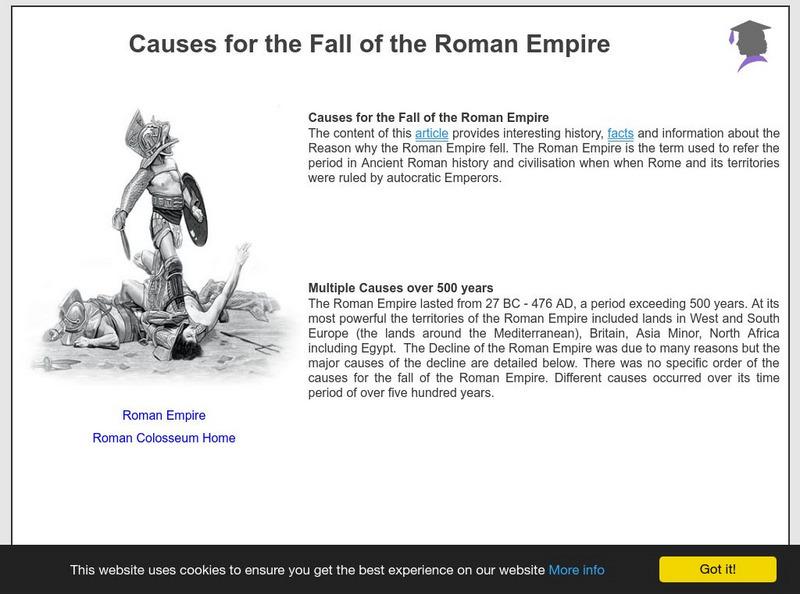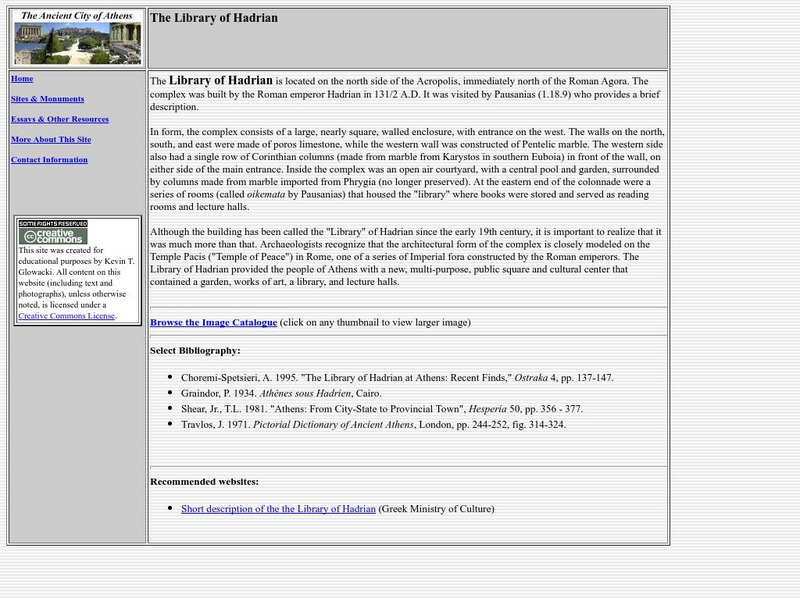Forum Romanum
Outlines of Roman History: Table of Contents
The complete text of a 1901 textbook on Roman history by William C. Morey. However, the work is still useful today as if covers all the basic information about Rome from its earliest beginnings through the Republic and later the Empire.
Khan Academy
Khan Academy: Damnatio Memoriae Roman Sanctions Against Memory
Damnatio memoriae is a term we use to describe a Roman phenomenon in which the government condemned the memory of a person who was seen as a tyrant, traitor, or another sort of enemy to the state. The images of such condemned figures...
A&E Television
History.com: How Ancient Rome Thrived During Pax Romana
After decades of political dysfunction, civil wars and assassinations that caused the Roman Republic's downfall, Ancient Rome flourished during two centuries of relative tranquility and prosperity known as the Pax Romana (Latin for...
Other
Siteseen Ltd: Causes for the Fall of the Roman Empire
This article addresses the many reasons why the world's greatest superpower of the 4th century, the Roman Empire, crumbled and fell. Many reasons are discussed in detail, including the spread of Christianity, the invasion of various...
Other
University of Illinois: The Early Centuries of the Greek Roman East
Read about the history of the Romiosini, or Greek Middle Ages and the development of the Greek-Roman east. The article is divided into two different sections. The first section includes the foundation of Constantinople as a means to...
Khan Academy
Khan Academy: Silver Shekel 2nd Jewish Revolt, Struck Over a Denarius of Hadrian
This silver coin shows how, in an act of defiance against Roman rule, the Jewish population in the province of Judaea over-struck portraits of the Emperor Hadrian with their own symbols. Jerusalem had been destroyed by Roman forces in 70...
Khan Academy
Khan Academy: Bronze Head From a Statue of the Emperor Hadrian
Hadrian (reigned 117-138 C.E.), once a tribune in three different legions of the Roman army and commander of a legion in one of Trajan's wars, was often shown in military uniform. He was clearly keen to project the image of an ever-ready...
Khan Academy
Khan Academy: Portrait of Vespasian
This naturalistic portrait of the emperor Vespasian (reigned 69-79 C.E.) clearly shows the lined complexion of this battle-hardened emperor, and also the curious 'strained expression' which the Roman writer Suetonius said he had at all...
Khan Academy
Khan Academy: Marble Statue of the Emperor Hadrian
The Roman emperor Hadrian is shown here in the himation (a Greek mantle). This unique and well known statue is made up of fragments found in 1861 in the ruins of a temple in the city of Cyrene, in northern Africa.
Khan Academy
Khan Academy: Forum and Markets of Trajan
Marcus Ulpius Traianus, now commonly referred to as Trajan, reigned as Romess emperor from 98 until 117 C.E. and had a reputation as a good emporer. A massive architectural complex-referred to as the Forum of Trajan was devoted to...
PBS
Pbs Frontline: The Martyrs
A very nice account which delves into the background of the persecutions of the early Christians under the Romans. The article provides specific historical details as to why and how Christians were being attacked.
Khan Academy
Khan Academy: The Raising of the Widow's Son From the Dead (Magdeburg Panel)
The Magdeburg Panel is one of a group of sixteen ivory plaques depicting a cycle of scenes from the Life of Christ. The original set, numbering forty or fifty, decorated a large piece of church furniture in Magdeburg Cathedral.
Khan Academy
Khan Academy: Imperial Fora
A series of public spaces in Rome called fora were built by Roman emperors and contained monumental art and architecture. View examples and read descriptions of Imperial fora built by Julius Caesar and Augustus.
Other
The Stoa Consortium: The Library of Hadrian
The Library of Hadrian is located on the north side of the Acropolis, immediately north of the Roman Agora. The complex was built by the Roman emperor Hadrian in 131/2 A.D. It was visited by Pausanias (1.18.9) who provides a brief...
Ibis Communications
Eye Witness: Nero Persecutes the Christians, 64 a.d.
This article provides a general overview of how Emperor Nero laid blame for the burning of Rome onto the Christians and put many to death.














